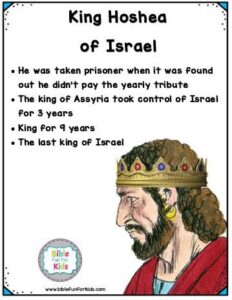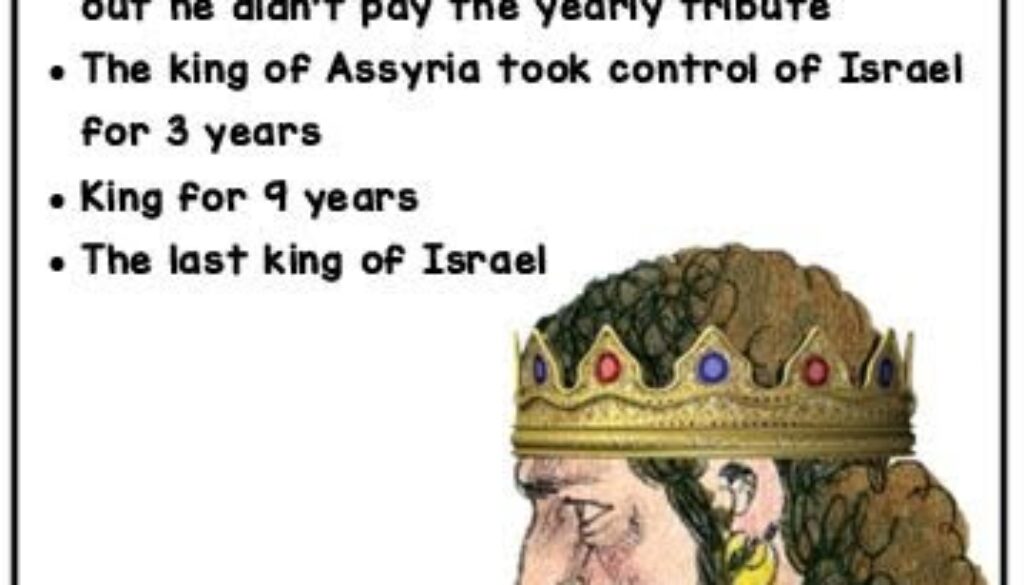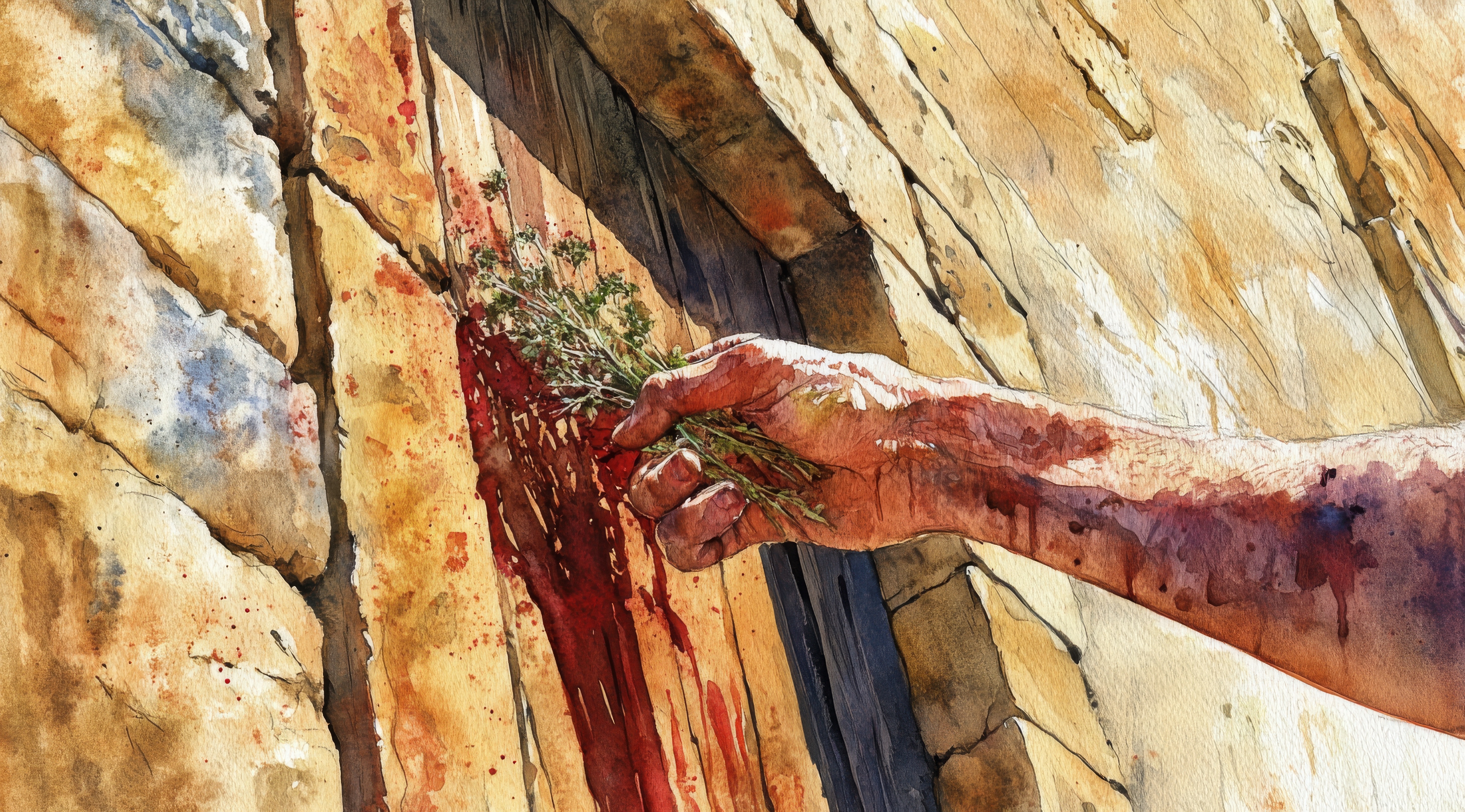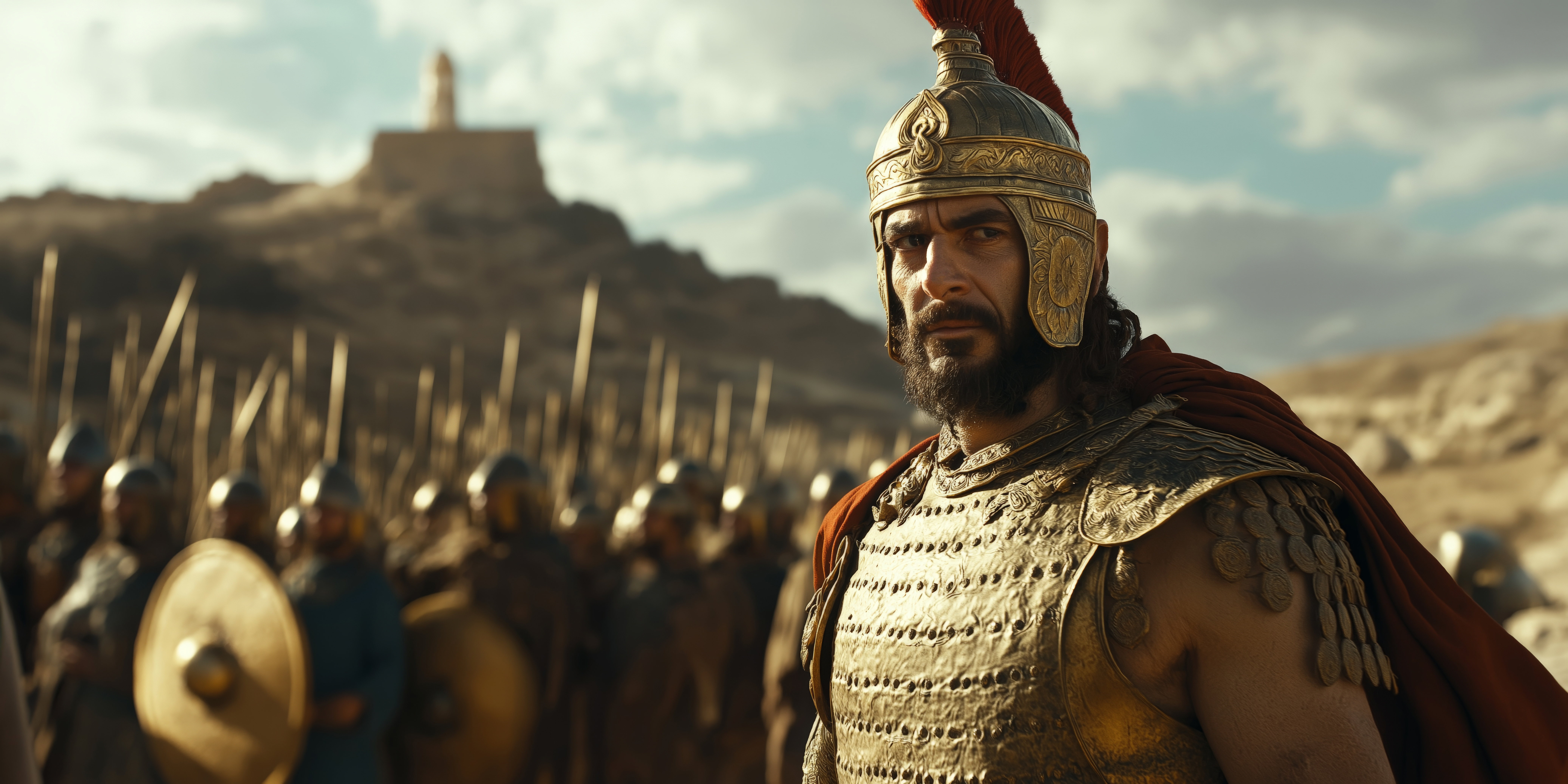2 Kings 17:1-5 Hoshea’s Reign

Pekah is dead, most likely by the hand of Hoshea. Hoshea takes the throne and rules as another ungodly king for nine years. He is the last king of Israel.
I was struck by the absence of the ‘transfer of power’ in our reading from Pekah to Hoshea. I looked diligently for the place where we are told when and how Pekah died but couldn’t find it. I even Googled how Pekah died but came up only with the statement that Hoshea assassinated him. There is no scripture reference for this. It is a natural assumption though since this is how the throne has changed hands most often in the kingdom of Israel. The only other option was through inheritance and since we know that Hoshea’s father was Elah, inheritance is off the table. We don’t even get a glimpse of how these two men encountered one another. No reference to Hoshea serving Pekah in any capacity. We simply jump to, “In the twelfth year of Ahaz king of Judah, Hoshea the son of Elah began to reign in Samaria over Israel, and he reigned nine years” (verse 1).
Since Hoshea is on the throne let’s move on from there. He followed in the footsteps of all the previous kings since the split of the nation of Israel and did not remove the golden calves Jeroboam had made. But we are told that he didn’t fall into ALL the sins his predecessors did. I’m going to assume that means he didn’t get into some of the same idol worship practices previous kings did. What did he refrain from? Did he worship Baal or bow before the Asherim poles? Did he frequent the “high places”? I will say probably yes to these two previous sins. He probably differed on his degree of depravity and didn’t burn his children as sacrifices to the gods. He might have also refrained from divination or chasing after omens.
He certainly didn’t turn to God for the rescue of the people. He turned instead to the same nation that had been attacking them earlier; the same one Judah turned to in their time of trouble.
God was judging His people for their sins, and there were MANY to account for. God was using Assyria at this time. Assyria had been attacking Israel for some time and had even entered into a relationship with Judah to protect them from an alliance between Israel and Syria. Ahaz became a vassal to king Tiglath-pileser. Now Hoshea was going to take on that same status under their current king, Shalmaneser.
I’m curious here to know if Assyria was like the nation of the Philistines where they had several kings. Philistia had kings of different cities. They were not a unified nation but city states of a loosely bound together people. We are given different names of the king of Assyria who was in control of the two halves of the nation Israel. Were these successive kings in Assyria or sister kings from different regions instead? Is there a reason Assyria didn’t reunify Israel since both halves were under their control? Probably because the northern kingdom stepped out of line while the southern kingdom didn’t.
Hoshea got in trouble for looking to even yet another source for deliverance. No, that source wasn’t God. It was Egypt. I have NO DOUBT that if Hoshea had turned to God for help, He would have listened. But Hoshea tried to work things out in his own strength. He stopped paying his tribute and sent for help from Egypt. That backfired on him in a BIG way.
First off, Egypt refused him help. I can’t say as I blame them because of the history between the two nations. Also Judah was between the two geographically. It wasn’t a ‘neighbor helping neighbor’ situation. Secondly, Hoshea welched on his promise to Assyria. What is to prevent him from going back on his promise to Egypt if later he finds a ‘better’ way to handle his problems. And finally, Assyria was extracting this tribute to promise they wouldn’t attack Israel. Israel was paying ‘protection money’ to keep Assyria at bay. No money = open season again. Egypt would have had to commit troops to Israel’s defense with no promise of success or profit to themselves. Not a good deal on any front.
Assyria noticed Hoshea’s change in allegiance pretty quickly and made them pay dearly. Hoshea was taken prisoner and thrown into the dungeon. Assyria attacked Samaria, the capitol city, relentlessly for three years until it fell under their assault. I have no doubt that they kept Hoshea informed of their progress during his captivity. For three years he was taunted with the knowledge that his people were being picked off one by one by the forces he swore to serve under. He probably heard every horror story his captors could come up with and probably a few they concocted too. That alone was torture; knowing you could do nothing for the people you swore to serve.
I wonder if Hoshea was killed when Samaria fell or if he too became one of the people in captivity. Political process would probably dictate that he die to relinquish the throne but I don’t know. He was still king while in prison during Assyria’s attack on Samaria. His reign ended when his kingdom fell. No kingdom, no king.
So what should we take from Hoshea’s story? First of all, know Who to turn to for help. Hoshea looked to man to solve his problems. Man ALWAYS falls short of complete deliverance. Man also comes with more conditions for his ‘help.’ God has ‘conditions’ too but they always lead to even more relief and freedom.
Hoshea’s second lesson was to keep his promises. I know the promise he made wasn’t a comfortable one but he gave his word and he needed to stick with it. God ALWAYS keeps His promises, even if it takes a LONG time to see the fulfillment of each and every one of them.
Holy Spirit, remind me always where my hope comes from. There is NO OTHER god but You Father. And I am secure in Your hands. Thank You that ALL Your promises will come true. The one I’m especially looking forward to is living with You for eternity. Continue to watch over me and guide my direction until that day arrives.




